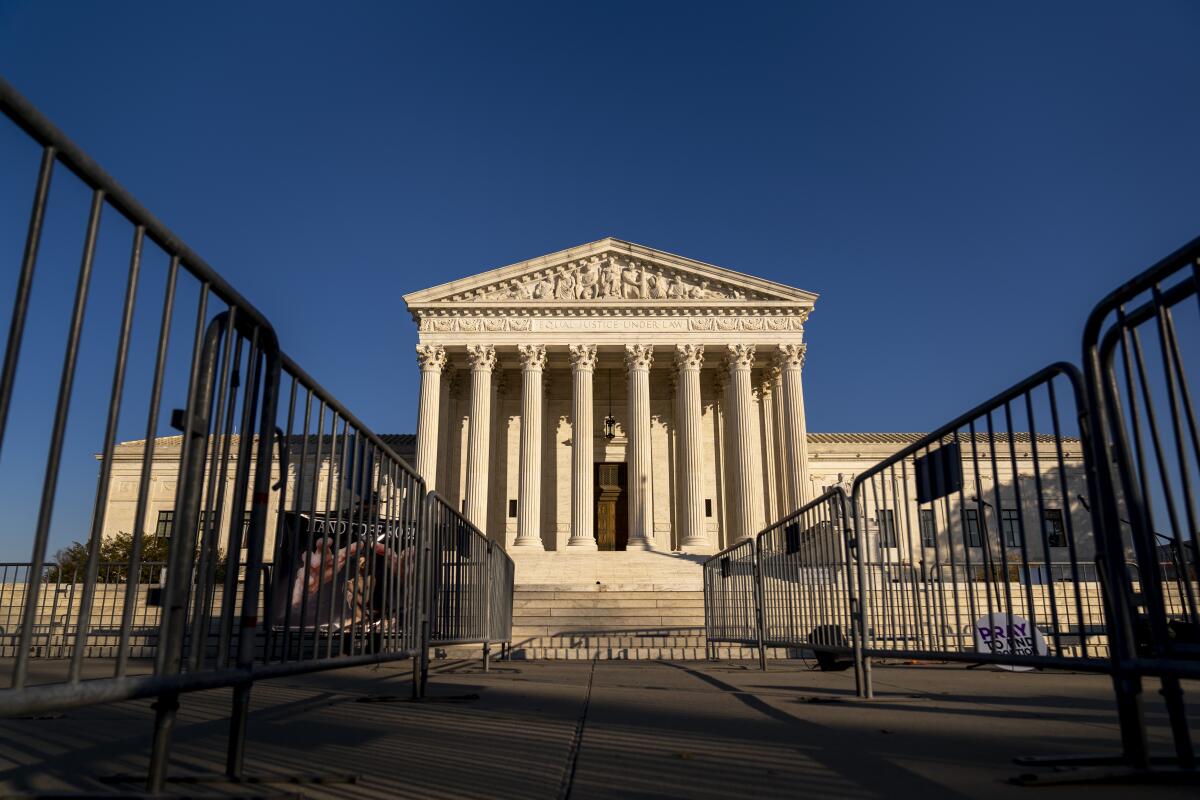Column: If Roe vs. Wade is overturned, Congress could protect abortion rights. At least in theory

- Share via
In a better world, the dismantlement of Roe vs. Wade by a newly empowered conservative Supreme Court majority wouldn’t be a devastating or insurmountable problem.
Congress could simply step in and pass a law codifying the protections of Roe and guaranteeing that abortion would remain legal throughout the country.
After all, most Americans support abortion rights, and a slim majority of Congress does too. So why not enact a federal statute that allows women to control their own bodies (rather than forcing them to carry and bear children against their will)? Even if the newly configured Supreme Court believes abortion is no longer a constitutional right, a national law would safeguard the right to choose.
Opinion Columnist
Nicholas Goldberg
Nicholas Goldberg served 11 years as editor of the editorial page and is a former editor of the Op-Ed page and Sunday Opinion section.
Arguably, a law might be just as good, and in some ways better, than relying on the protection of the courts.
Judicial fiat is not necessarily the best way to address divisive social issues. It is often better to settle grand disputes among citizens through the political process — by having members of Congress debate, deliberate and vote, rather than having a group of unelected justices interpret often-obscure constitutional language.
Frankly, it has always been tough for laypeople to wrap their minds around the Supreme Court’s ruling in Roe. The Constitution obviously doesn’t mention abortion, nor does it mention the “right to privacy” that the justices used to justify the right to an abortion. Rather, the justices concluded that a right to privacy is implicit in the due process clause of the 14th Amendment.
Now, I’m fine with that logic, but it’s not exactly straightforward. And that’s part of the reason the decision has remained controversial for nearly 50 years. Even many abortion rights supporters — including the late Justice Ruth Bader Ginsburg — voiced doubts about the way the Supreme Court decided the case.
So a national law protecting abortion rights makes sense. And after last week’s oral arguments at the Supreme Court in Dobbs vs. Jackson Women’s Health Organization showed how endangered Roe vs. Wade really is, Democrats amped up their support for one. On Sunday, for instance, Sen. Amy Klobuchar (D-Minn.) argued on “Meet the Press” against allowing a “patchwork” of laws, many of them restricting or banning abortions, to be passed by state legislatures around the country.
Experts say voters want to hear about inflation and schools and COVID-19. But it all comes back to Trump.
“The most sane route to get this done right now would be to bring this up before the U.S. Senate to codify Roe v. Wade into law,” Klobuchar said.
Senate Majority Leader Charles E. Schumer (D-N.Y.), for his part, has said he will allow a vote on the Women’s Health Protection Act, a bill that would codify Roe and keep abortion legal nationwide, “in the very near future.”
But there’s a problem. A big problem. Neither the Women’s Health Protection Act nor any other bill guaranteeing access to abortion is likely to be enacted unless something dramatically changes in Washington.
The problem, of course — as usual — is the filibuster.
It’s not that Americans wouldn’t approve of a law protecting abortion rights. According to the Pew Research Center, 59% of American voters believe abortion should be legal in all or most cases and only 39% believe it should be illegal.
And it’s not that the bill lacks support in Congress.
The House, in fact, has already passed the Women’s Health Protection Act, which is in some ways even stronger than Roe vs. Wade. (Among other things, it empowers the U.S. Department of Justice to enforce its provisions.)
The Senate could also probably pull together a majority in favor of a bill to codify Roe, after a couple of Democrats defect and a couple of Republicans come over (and if certain concerns by pro-choice Republicans are addressed).
But unfortunately, the Senate doesn’t work by majority rule.
The practical reality of the filibuster is that it takes the support of 60 senators for most bills to become law. That’s the number of votes required — three-fifths of the full Senate — to end floor debate and proceed to an up-or-down vote.
And there’s virtually no chance that the Women’s Health Protection Act or any pro-choice variant will have that level of support.
The Democrats were once the party of ideals and optimism. But in the era of COVID and climate change, the message has turned dark.
Of course, the Senate could theoretically do away with the filibuster — or modify it in any of a number of ways. That would make many progressive Democrats very happy.
“This is one more time when we see the filibuster blocking the will of the majority,“ Sen. Elizabeth Warren (D-Mass.) said on MSNBC last week. She noted that the Women’s Health Protection Act “is something we ought to be able to bring to the floor of the United States Senate and vote on it.”
And while there are not enough votes at the moment to change the filibuster rules, that could change.
“If the court overturns Roe v. Wade, the floodgates will open and there’ll be a different political calculus on the filibuster than there is right now,” Nancy Northup, president of the Center for Reproductive Rights, told me.
We’ll see. Perhaps so. I’m skeptical.
I’m also enough of a realist to know that the elimination or modification of the filibuster would be a mixed blessing for Democrats. It might help in the short term — and could propel the Women’s Health Protection Act to passage, which would be a very good thing. But Democrats will be harmed by it when their opponents are in power.
The fact is, Congress is polarized, paralyzed and generally dysfunctional for a host of reasons — and that only increases the relative power of the newly confident, six-member majority of conservative justices on the Supreme Court. At the moment, they have little reason to moderate their stances or compromise or tone down right-wing positions on such issues as affirmative action, gun rights, labor and abortion.
Congress can be a counterweight to an activist court, but only if it can function effectively and get the job done.
More to Read
A cure for the common opinion
Get thought-provoking perspectives with our weekly newsletter.
You may occasionally receive promotional content from the Los Angeles Times.














